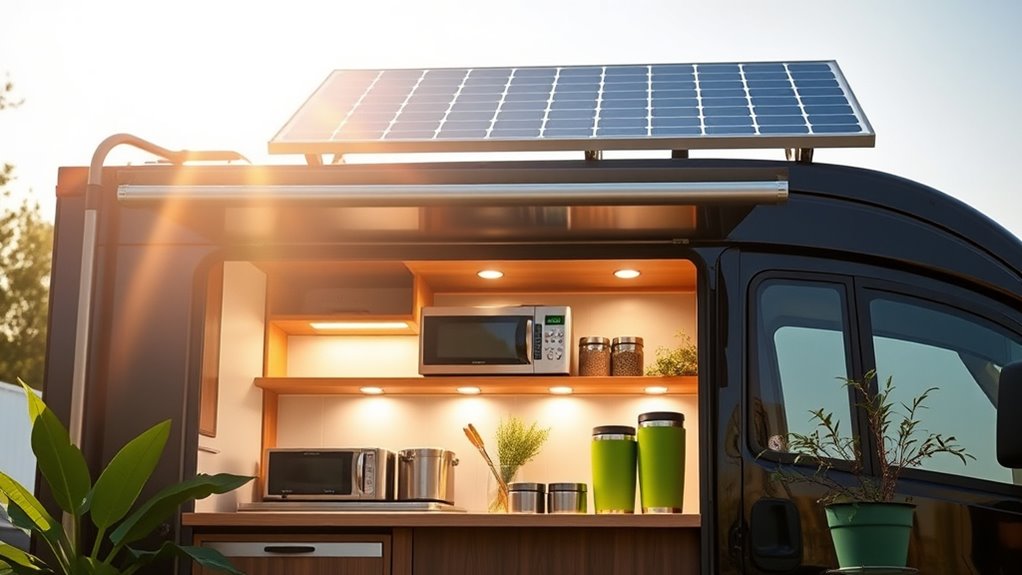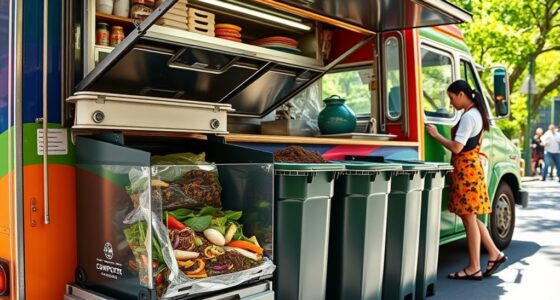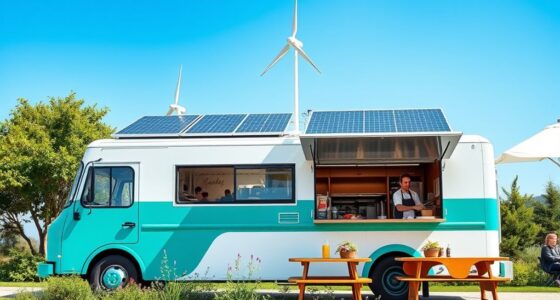To reduce energy consumption in mobile kitchens, focus on optimizing appliance usage and choosing energy-efficient models. Install LED lighting with motion sensors to save power, and use smart automation to control heating, cooling, and lighting based on occupancy. Improve insulation and ventilation to minimize climate control energy. Consider renewable energy sources like solar or wind, combined with storage systems for reliable power. Keep exploring these strategies to maximize savings and sustainability in your mobile kitchen.
Key Takeaways
- Regularly maintain appliances and upgrade to energy-efficient models to ensure optimal performance and reduce energy waste.
- Install LED lighting combined with motion sensors to automate lighting and minimize unnecessary power usage.
- Enhance insulation and optimize ventilation to lower heating and cooling energy demands.
- Incorporate renewable energy sources like solar panels with energy storage for a sustainable power supply.
- Use smart automation technologies to monitor and control lighting, heating, and cooling for maximum efficiency.
Optimizing Appliance Usage and Selection
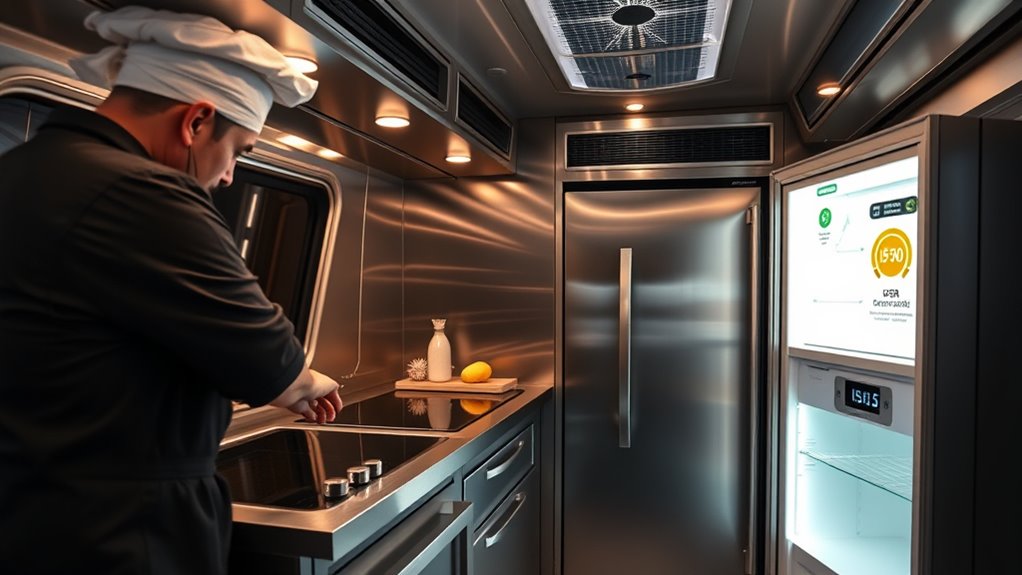
To reduce energy consumption in mobile kitchens, you should focus on optimizing appliance usage and selection. Regular appliance maintenance ensures machines run efficiently, preventing energy waste from misfiring or malfunctioning equipment. Properly maintained appliances consume less power and last longer, saving you money in the long run. Equally important is staff training, which empowers your team to operate appliances correctly and avoid unnecessary energy use. Train staff to turn off equipment when not in use and select energy-efficient models when upgrading. By combining diligent appliance maintenance with informed staff practices, you create a more energy-conscious environment. Additionally, incorporating AI-driven data analytics can help monitor and optimize energy consumption patterns in real-time. This approach helps cut costs, reduces environmental impact, and ensures your mobile kitchen runs smoothly and sustainably. Moreover, integrating advanced AI features like real-time monitoring can further enhance efficiency by providing actionable insights and predictive maintenance alerts. Leveraging AI technology can also assist in identifying peak usage times, allowing for better scheduling and resource allocation. Utilizing sound analysis techniques can provide additional data on equipment operation and potential issues, further improving energy efficiency.
Implementing Energy-Efficient Lighting Solutions
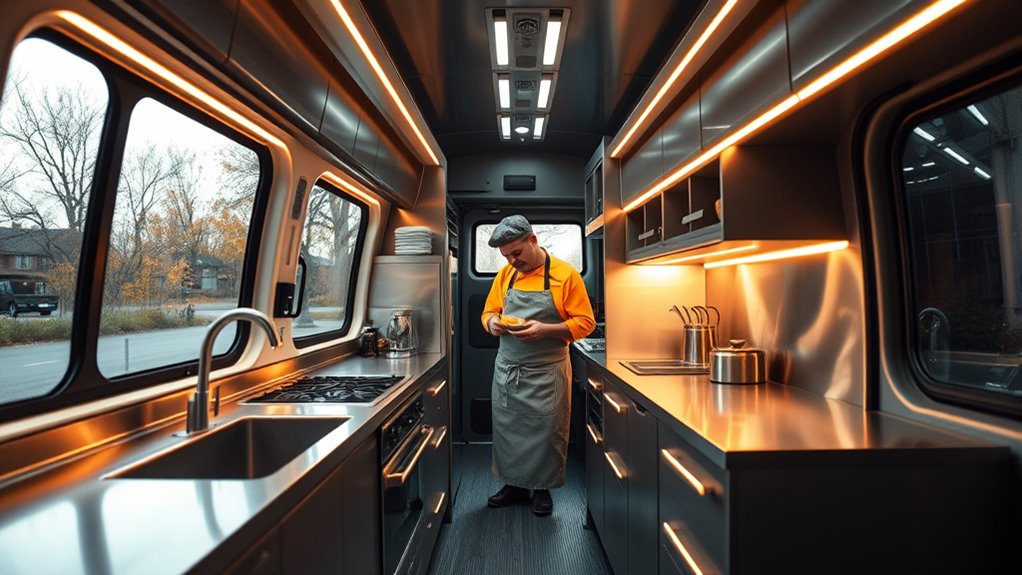
Have you considered how lighting choices impact your mobile kitchen’s energy use? Switching to energy-efficient lighting solutions can markedly cut your power consumption. An LED retrofit allows you to replace traditional bulbs with LEDs, which use less energy and last longer. This simple upgrade boosts efficiency without sacrificing brightness. Additionally, installing motion sensors ensures lights turn off automatically when areas are unoccupied, preventing waste. Motion sensors are especially useful in storage spaces and wash stations, where lights often stay on unnecessarily. By combining LED retrofits with motion sensors, you create a smarter lighting system that reduces energy use and lowers costs. These small changes make a noticeable difference in your mobile kitchen’s overall energy footprint, promoting sustainability and operational savings.
Utilizing Smart Technologies and Automation
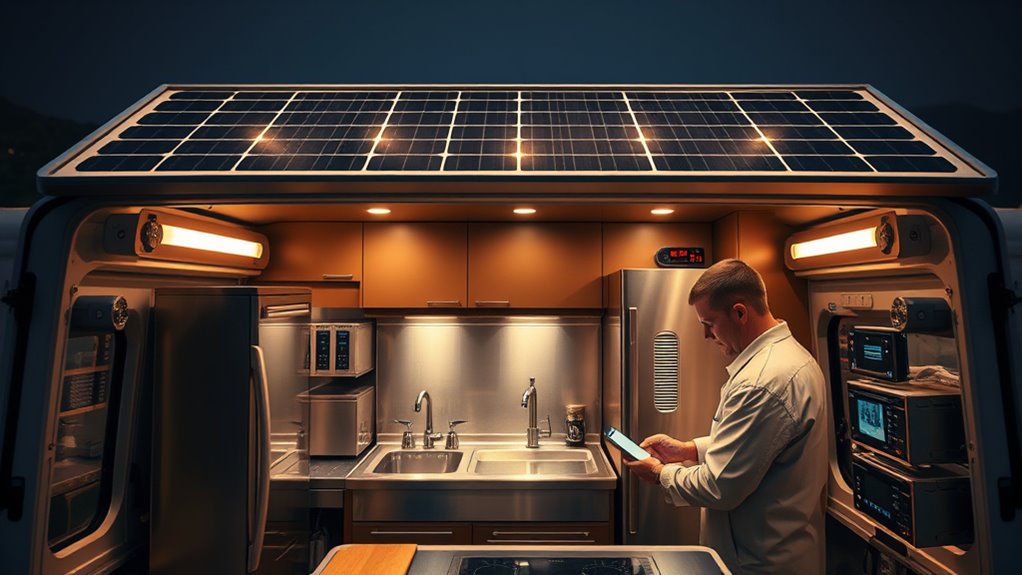
By integrating smart technologies and automation, you can substantially optimize your mobile kitchen’s energy management. Sensor integration enables real-time monitoring of equipment and environment, helping you identify inefficiencies immediately. Automation systems can adjust lighting, heating, and cooling based on usage patterns, reducing unnecessary energy consumption. Energy management systems can also provide detailed insights into usage trends, allowing for more targeted improvements. Implementing predictive maintenance, driven by data analytics, allows you to address equipment issues before they cause energy waste or failures. Incorporating smart thermostats and energy meters further improves control and accountability. These tools work together to minimize waste, enhance performance, and extend equipment lifespan. Incorporating energy-efficient devices ensures that your mobile kitchen operates at optimal efficiency. Leveraging advanced sensor technology enables even more precise control over energy use. By embracing automation and sensor integration, you streamline operations, lower costs, and contribute to a more sustainable mobile kitchen environment. This proactive approach is supported by regional resource availability, ensuring you have access to the latest innovations. This proactive approach guarantees consistent energy savings and operational efficiency.
Insulating and Ventilating for Better Energy Management
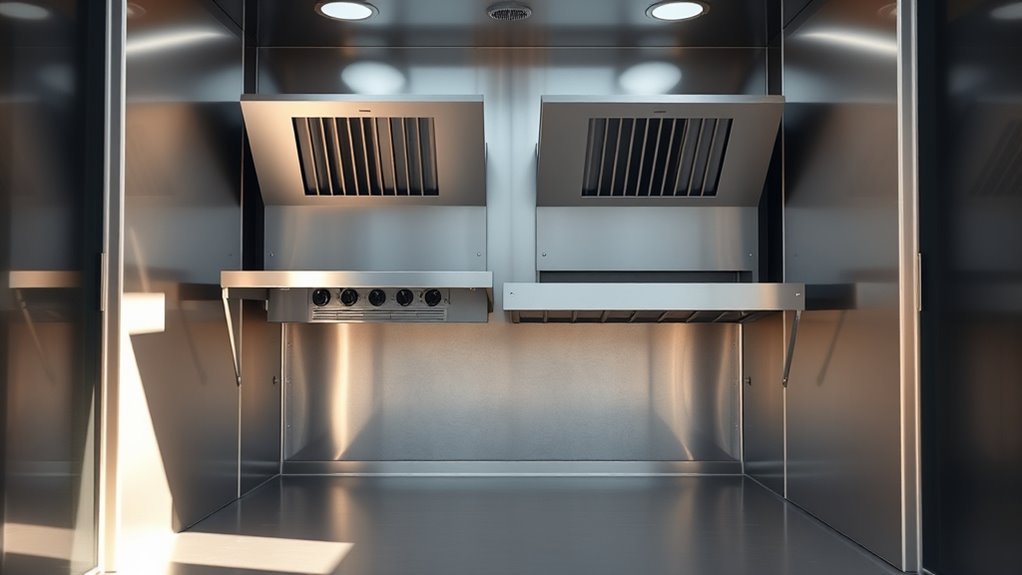
Effective insulation and ventilation are key to controlling energy use in mobile kitchens, especially since temperature fluctuations can lead to increased heating or cooling demands. Proper thermal insulation keeps heat inside during colder months and blocks heat entry during warmer periods, reducing energy needed for climate control. Focus on high-quality insulation materials to minimize thermal transfer. Good air circulation ensures consistent airflow, preventing hot or cold spots and maintaining a stable environment. Ventilation also helps remove excess humidity and odors, which can make cooling systems work harder. By optimizing insulation and air circulation, you reduce strain on your heating and cooling systems, ultimately lowering energy consumption. Additionally, air quality management through proper ventilation can improve working conditions and food safety in your mobile kitchen. Incorporating energy-efficient ventilation systems can further optimize overall energy management. Using thermal insulation techniques can significantly enhance the effectiveness of your insulation strategy, leading to further energy savings and improved climate control. Implementing passive design strategies that leverage natural airflow and shading can also reduce reliance on mechanical systems, further decreasing energy use.
Adopting Sustainable Power Sources
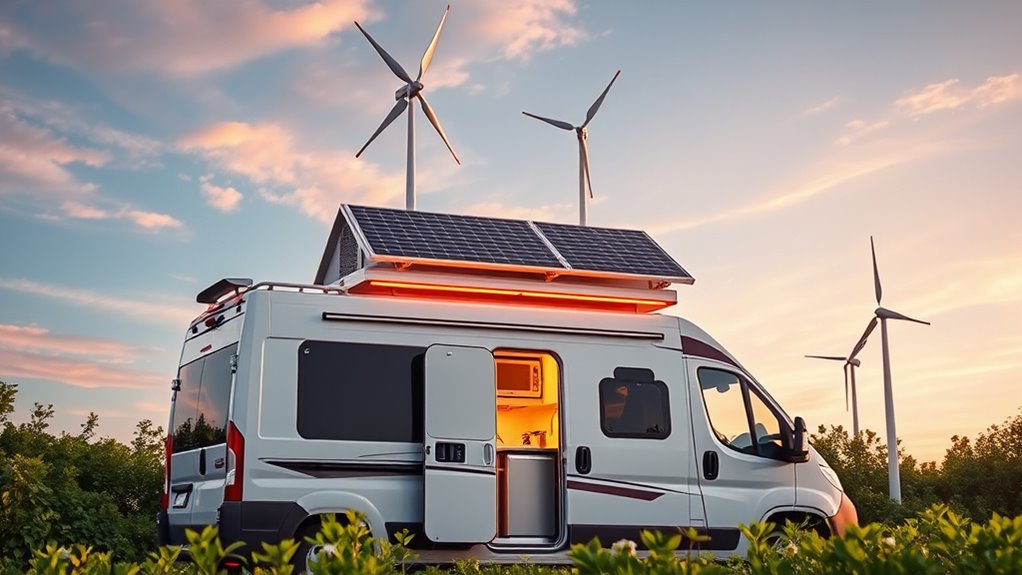
Switching to sustainable power sources is a crucial step toward reducing energy consumption in your mobile kitchen. Installing solar panels and wind turbines allows you to harness renewable energy, cutting reliance on grid power and lowering costs. These sources work best when used together, providing a reliable energy supply regardless of weather conditions. By adopting these technologies, you support environmental sustainability and improve your operational efficiency. Consider the following:
- Reducing carbon footprint through clean energy use
- Decreasing dependence on fossil fuels
- Enhancing energy resilience during remote operations
- Lowering long-term energy expenses
- Promoting eco-friendly practices to clients and partners
Integrating solar panels and wind turbines empowers you to operate more sustainably, ensuring your mobile kitchen stays eco-friendly and energy-efficient. Natural materials such as wood and stone can also be incorporated into your setup to further enhance sustainability and aesthetic appeal. Additionally, utilizing renewable energy systems can lead to increased cost savings and energy independence over time. Implementing energy storage solutions can help manage energy supply fluctuations and maximize efficiency. Furthermore, understanding battery technologies enables you to select appropriate storage options that optimize your energy use.
Frequently Asked Questions
How Can Mobile Kitchens Track Real-Time Energy Consumption?
You can track real-time energy consumption in mobile kitchens through energy monitoring systems that connect to appliances and equipment. These systems gather data analytics to provide instant insights into energy use. By installing smart meters and sensors, you’ll receive continuous updates, helping you identify inefficiencies and optimize energy management. This proactive approach guarantees you stay informed and make adjustments to improve overall energy efficiency.
What Training Is Needed for Staff to Maximize Energy Savings?
Imagine a bustling mobile kitchen where every staff member’s actions light up efficiency. You need to train your team on staff awareness and operational procedures that highlight energy-saving habits. This training empowers them to recognize energy waste, follow best practices, and make quick adjustments. By fostering a culture of mindful operation, you’ll maximize energy savings while maintaining excellent service, creating a more sustainable and cost-effective mobile kitchen environment.
Are There Government Incentives for Eco-Friendly Mobile Kitchen Upgrades?
You should explore government grants and tax incentives available for eco-friendly mobile kitchen upgrades. Many programs support energy-efficient equipment and sustainable practices, making it more affordable to implement greener solutions. Check with local, state, or federal agencies, as they often provide funding or tax benefits. By taking advantage of these incentives, you can upgrade your mobile kitchen while saving money and reducing your environmental impact.
How Do Weather Conditions Affect Energy Efficiency Strategies?
Weather impact profoundly influences your energy efficiency strategies in mobile kitchens. Hot, humid conditions increase cooling needs, while cold weather boosts heating demands, making climate adaptation essential. You should adjust insulation, ventilation, and appliances based on weather forecasts to optimize energy use. By staying proactive and tailoring your approach to seasonal changes, you guarantee your mobile kitchen remains efficient year-round, saving energy and reducing costs.
What Are the Long-Term Cost Benefits of Energy Reduction Measures?
Think of energy reduction measures as planting seeds for a fruitful orchard. Over time, you’ll see abundant cost savings and a strong investment return that keeps bearing fruit. By cutting energy waste now, you lower your operational costs long-term, making your mobile kitchen more sustainable and profitable. These measures turn initial efforts into ongoing benefits, ensuring you enjoy the rewards of smarter energy use for years to come.
Conclusion
By embracing these energy-saving strategies, you can turn your mobile kitchen into a modern-day Icarus—soaring toward sustainability without risking a fiery fall. Just as Daedalus crafted wings from ingenuity, your smart appliance choices and efficient practices craft a greener future. Every step you take toward reducing energy use echoes the timeless pursuit of excellence and balance. So, harness these ideas and elevate your mobile kitchen’s efficiency—your journey to sustainability is within reach.
